Perhaps you’ve seen them on TV when Eurosport used to cover the Berlin Six Days – or maybe you remember them at Leicester, ‘back in the day?’
The ‘Big Motors.’
When the sport of bicycle racing on the track was developing, one hundred years and more ago, promoters were always seeking ways of making the racing faster, more spectacular (and dangerous) for the punters.
Paced races were the answer, where the riders tucked in behind tandems, triplets, quads – or even more multi-rider machines I don’t know the names of – to achieve big speeds.
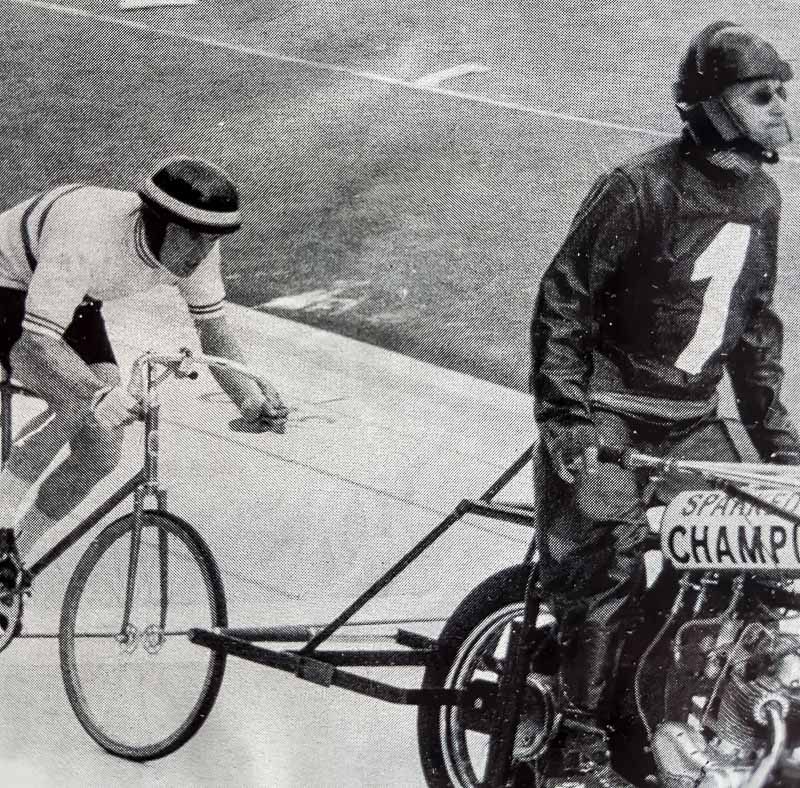
Then someone hit on the idea of using motor bikes and the seeds of the ‘Big Motor’ racing were sown.
As a world championship event it was last run as an ‘open’ pro/am championship in 1994; the pay-offs, bribes and scamming between the pace drivers which had become endemic in the championships by then had become too much, even for the UCI.
But the sport remains popular in Germany and the Berlin Six Day crowd still love being deafened by those big BMW’s – whilst no summer German outdoor track meet is complete without it’s ‘stayer’ race.
It’s on these big old outdoor concrete tracks where the roller which keeps the rider at a set distance behind his pacer is pulled in tighter to give more shelter that the speeds get really crazy.
Germany, along with The Netherland were always ‘Heartland’ for the sport but in Britain back in the early 70’s we had one of the best in the world in Roy Cox.
Cox was six times British Champion, won big on the German ‘stayer’ circuit, rode four World Championships and made the Worlds final in his home Worlds in 1970 – the first British amateur to do so in 70 years.
VeloVeritas recently caught up with him to discuss his career behind the big bikes.
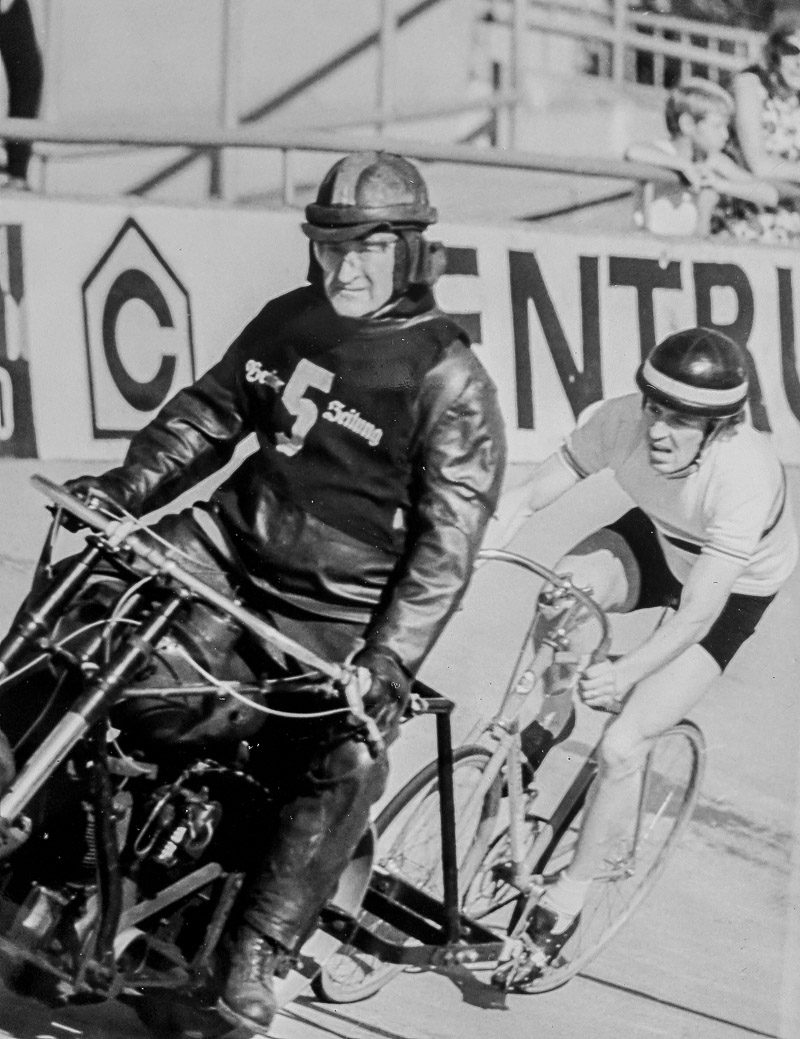
How did you get into motor pacing, Roy?
“I rode all sorts of races from the criteriums to hill climbs but I liked the track best – I rode a motor paced race at Herne Hill with Ron Webb as my pacer. Ian Alsop won with me second and the World Champion, Piet de Wit (Netherlands) third (World Amateur Motor Paced Champion 1966 and ’67, ed.)
“That got me a bit of ‘name’ behind the motors and I got invites to East Germany where I was second at one meeting and won the other, in Leipzig, beating the Dutch World Champion Bertus Boom (World Amateur Motor Paced Champion in 1969 and bronze medallist in 1971, ed)) who was paced by the legendary Bruno Walrave (the Dutch master pacer guided his riders to 15 world titles; nine amateur, five professional and one ‘open,’ ed.) – and breaking the track record.
“Then I won the British Champs at Manchester by 10 laps, paced by Jim Patterson.
“The rides in Germany got me invites to go back and race the winter tracks and I was back to Leipzig and Berlin over the winter for the next three or four years.”
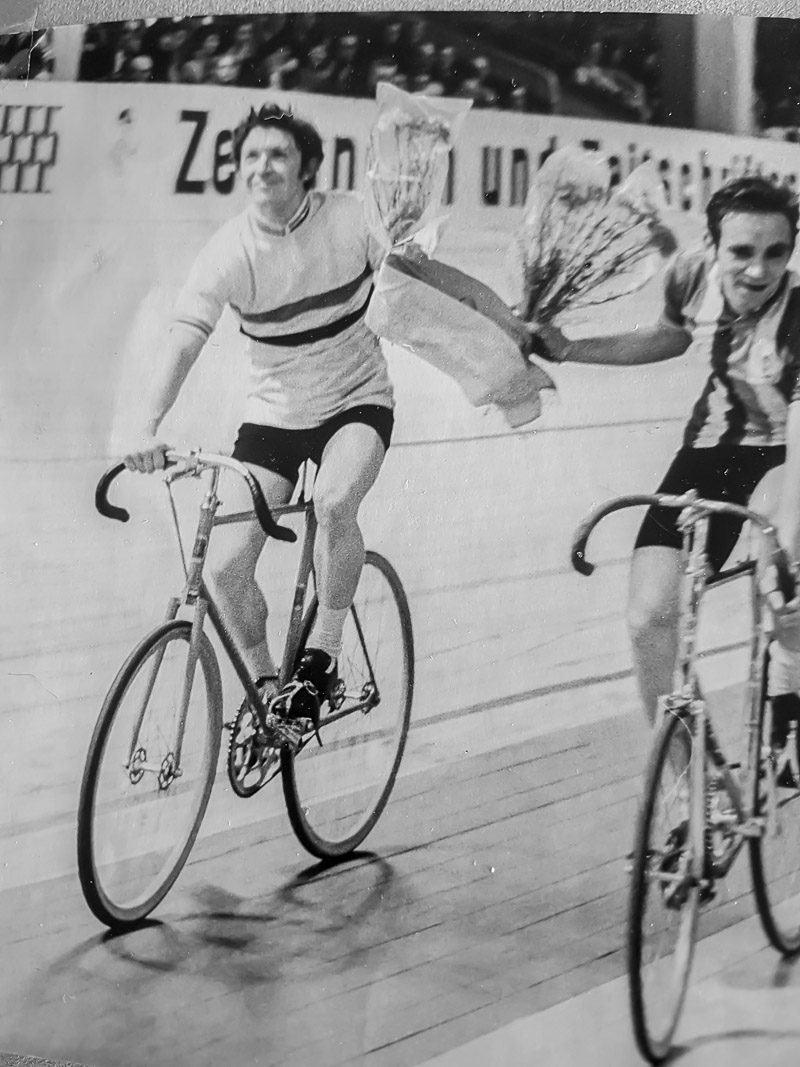
Ron Webb was your mentor?
“Yes, he was an Australian who moved to England; he was promoter of the London Six Days back then but had actually been a motor paced rider himself, taking a bronze in the Worlds.
“Ron taught me everything about the game – but not just about cycling, about life, he was like a father to me.
“I wouldn’t have achieved what I did if he wasn’t for Ron, the four Worlds I rode he was there with me, he’s still a close friend to this day.”
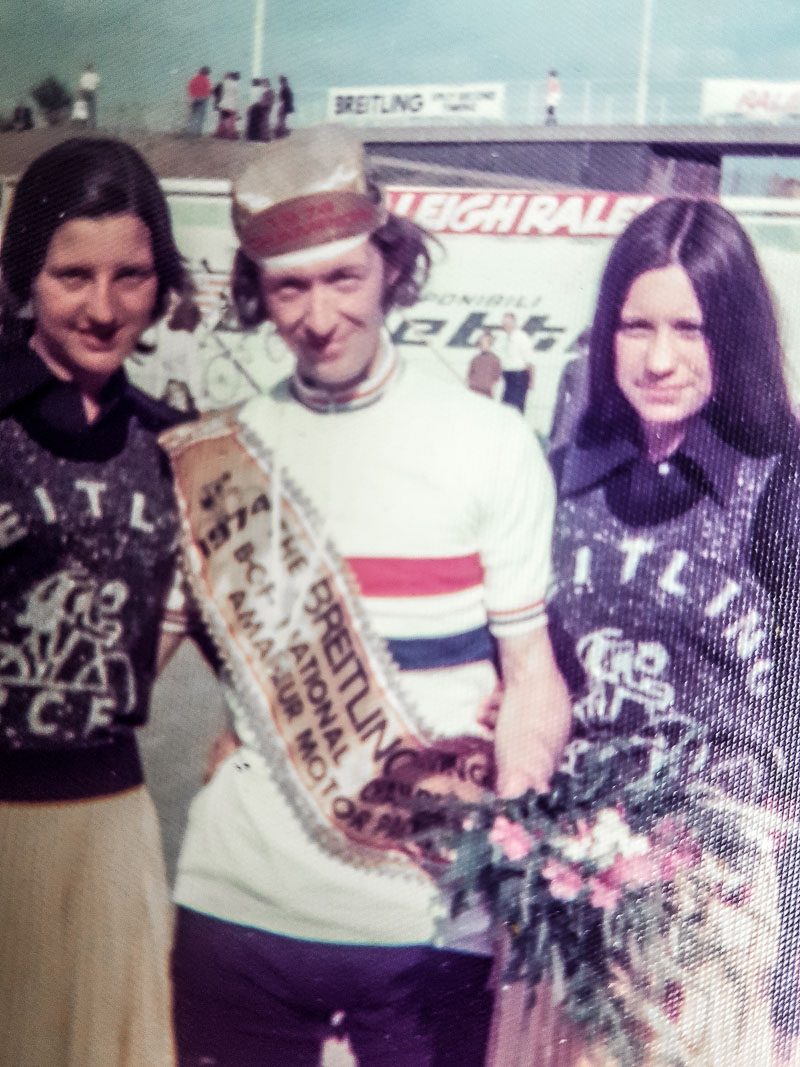
Six consecutive times British Champion?
“Yes, from 1970 onwards with Jim Patterson, that year; Bertus de Graf paced me to one in 1971 and Jack Collins to the other four titles.
“The first one was at Manchester, the rest on the Leicester track.”
Those pace following bikes are highly specialist.
“Yes, Ron got Geoffrey Butler Cycles to build me a frame, a replica of the bike he took to third in the Worlds and I managed to get all the kit together, big chainrings and special wide nosed saddle.
“Ron used to ‘bandage on’ the tyres for me, stuck over the sidewall and rim and back up to the other sidewall to take the stresses of the high speed on the bankings – we always used Continental tubulars which Ron got for me in The Netherlands.
“We’d do that in his office in London then go down the Kings Road to look at the girls!”
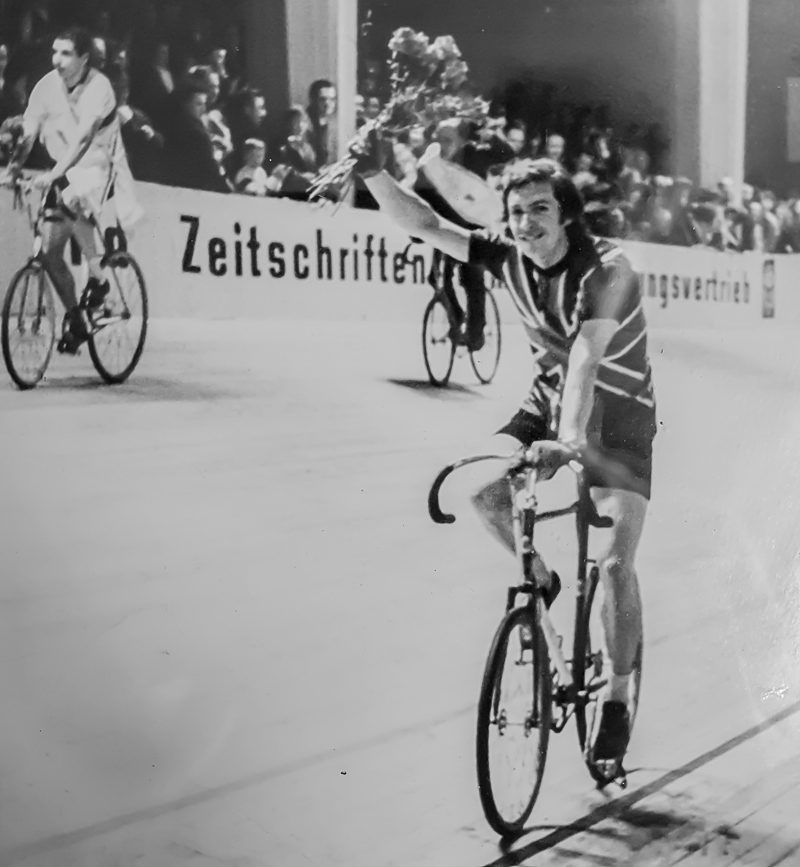
The ’70 Worlds, you made the final, not easy with all the double-dealings.
“I honestly believe I was worth a medal that year, I got into the final by winning the repechage; but prior to the final I’d loaned my back wheel to a another British rider for his ride and he’d changed the sprocket without telling me.
“As a result I was 10 inches overgeared in the race – with the benefit of hindsight I think it was deliberate, in order to mess up my chances.”
Was the Machiavellian stuff as bad as we’ve heard?
“Yes. In 1971 I’m pretty sure the pacers were paid to fix me up – there was a lot of money changing hands.
“The sport was big for the Dutch and German riders with big bonuses paid for world titles.
“I could win at the highest level – in ‘73/’74 I’d beaten all of the medallists – but the Worlds were different.”
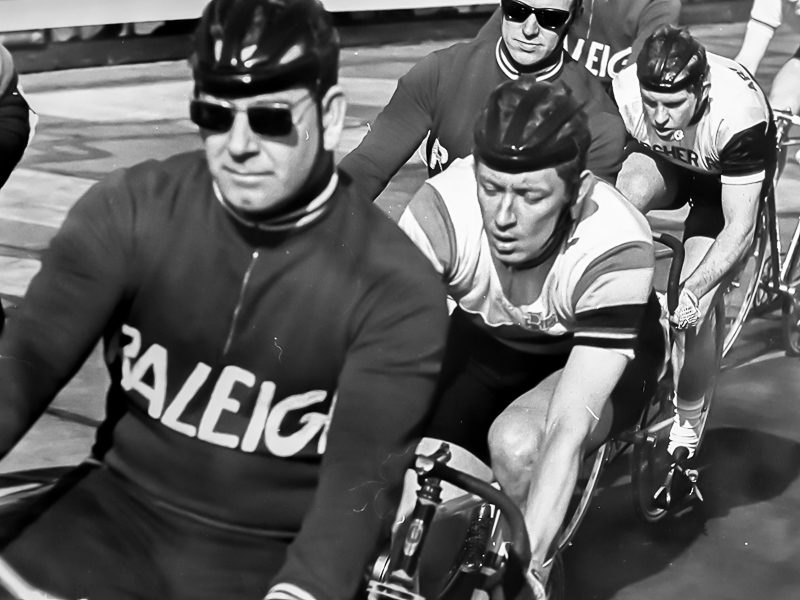
Just how important is the pacer?
“It’s 50/50, rider/pacer so he’s very important, but it was difficult if you weren’t Dutch or German with the UCI bringing in a rule that you had to have a pacer of the same nationality as yourself.
(Aussie’s Danny Clark won two Worlds behind the big motors but circumvented this rule because it didn’t apply to riders from ‘Lesser Cycling Nations’ – as Australia was classed back then, ed)
“My German pacer Herbert Schondorf who took me to my first big win Leipzig said that if I had been born German, I could have won the Worlds.
“He’d paced Heinz Wahl (German Democratic Republic) to a Worlds silver in 1958 during his career and reckoned that I was stronger rider.
“Hindsight is a great thing but perhaps I should have gone to live in The Netherlands or Germany – but I got married after the Worlds in 1970 so it would have been difficult.”
How did you train for the motor paced?
“I rode a lot on the road, I won some decent road races and that gave me stamina but I’d fancied myself as a sprinter and used to train for that discipline on Salford Park track.
“I was also four times in the team which won the British Team Pursuit Championship – I was on the short list for the 1968 Mexico Olympics for that event – in the British I rode with the late Trevor Bull, Fred Booker, Grant Thomas and John Patston.
“I actually rode an amateur Six Day with Grant in Germany and John and I won a two-up time trial at Brentwood, together.
“So I had the stamina from the road and the speed from the track; and whilst my first love was the track, I rode everything, grass track, criteriums – I won the Horseshoe Pass Hill Climb three years running!”
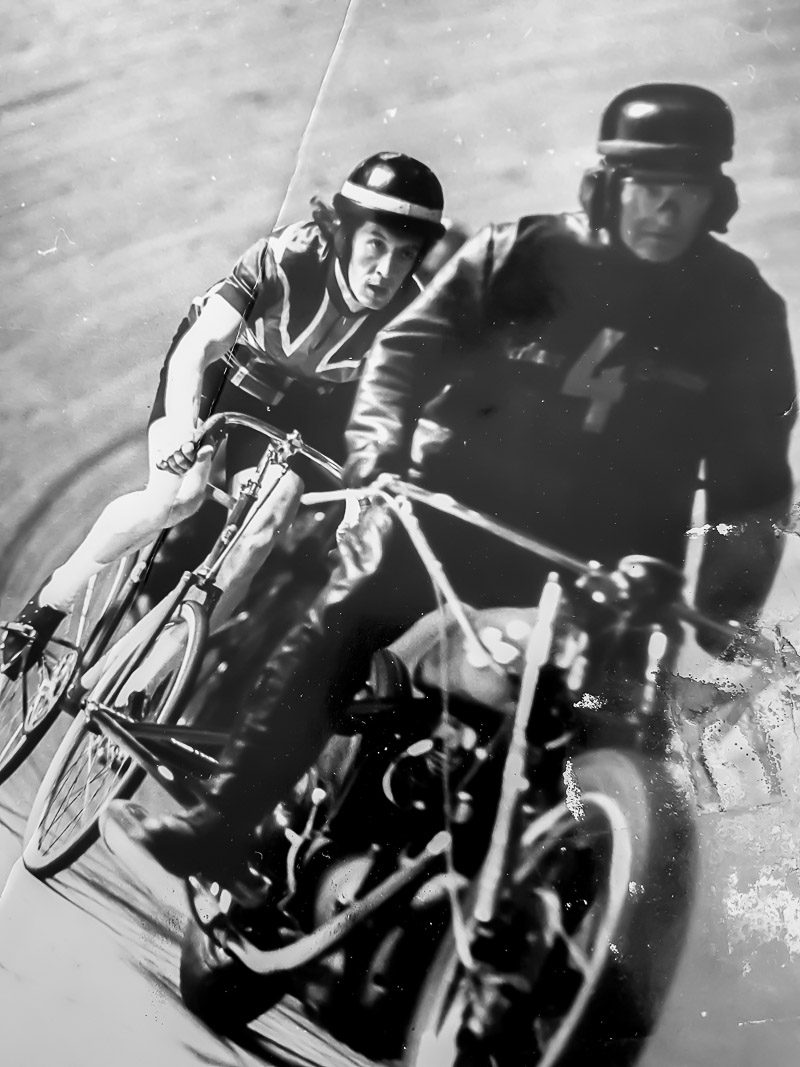
Your best ride?
“That first big win in Leipzig is one I’m proud of and getting into the Worlds final was an achievement.
“I won the British six times but at the Worlds it was different with all the bonus money that was floating around – that was the reason I quit, I was disillusioned with that aspect of it.
“Winning at the highest levels in Britain was one thing – but the World Championships was another…”
I actually pushed Roy off in a ‘stayer’ race at Fallowfield, Manchester back in the ‘70’s. I was down with my club mate, sprinter Andy Henderson and was enlisted to give Roy ‘a hell of a shove’ at the start.
I can still remember those big bikes – Nortons, if I remember rightly – hurtling around the big bankings. And Roy winning, of course.
With thanks to Roy for his time and the use of his images.



